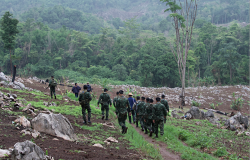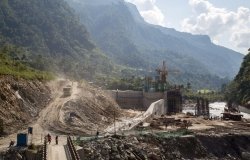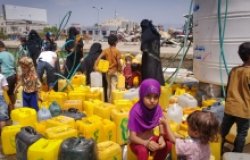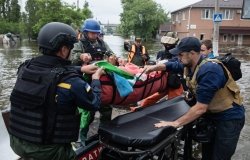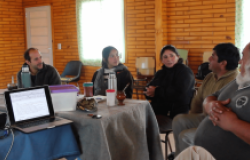Climate Change Solidly on Germany's Security Agenda, Says ECSP Director
JANUARY 2009—Dabelko Discusses Climate-Security Links in Hamburg, Berlin
Climate change's links to security were on Germany's academic and policy front-burners in 2008. But will that high level of attention continue in 2009? "I think the answer is a guarded ‘yes,'" says Geoff Dabelko, director of the Wilson Center's Environmental Change and Security Program. Dabelko recently returned from a trip to Hamburg and Berlin, where he spoke with scholars, practitioners, and military officers working hard to determine the next steps on climate change and security.
"Climate and security links are now on the German agenda—the fight to get them there has been won," says Dabelko. "The challenge now is translating the perceived legitimacy of the topic to a research and policy agenda that drills down to what links are, or could be, in specific settings and what the policy responses should be."
The German focus on climate and security, underway for some years, received a boost when Germany held the EU presidency during the first six months of 2007. The government of Chancellor Angela Merkel—particularly Germany's Federal Foreign Office—raised the profile of climate change, including the narrower issue of climate-security links. In addition, the German government supported the efforts of EU foreign and security policy chief Javier Solana and the European Commission's Directorate-General for External Relations to highlight climate-security links and develop a coherent EU position. The June 2007 release of World in Transition: Climate Change as a Security Risk by the highly respected German Advisory Council on Global Change provided a scholarly stamp of approval in a country where scientists carry significant weight with politicians.
The current economic crisis will test climate change's staying power on the political agenda, says Dabelko. The December summit in Brussels to formulate the EU position on climate change resulted in a markedly less aggressive stance at the UN Climate Change Conference in Poznan, Poland, later that month. Ironically, Merkel led the retreat, in a clear reversal from her positions on the issue even just months earlier. Her protection of the powerful German auto industry in the face of economic crisis may signal rougher seas for global efforts to combat climate change, warns Dabelko.
Dabelko was invited to speak in Hamburg by Michael Brzoska, director of the Institute for Peace Research and Security Policy at the University of Hamburg. A campus-wide initiative, "Integrated Climate System Analysis and Prediction" (CliSAP), includes a climate and security project that focuses on climate change's links to local conflicts; how climate change becomes a security issue; and the security implications of climate change-related energy policies. Dabelko's visit provided an opportunity to discuss the current state of climate and security research inside and outside Europe.
While in Hamburg, Dabelko also spoke to a group of faculty at Führungsakademie der Bundeswehr (the German Military Leadership Academy) on the possible implications of climate change and security for the German military and NATO. Audience members asked about prospects for a new U.S. climate policy and how the U.S. security community views climate-security links.
Dabelko met with longtime ECSP partner and Adelphi Research co-director Alexander Carius and his colleagues in Berlin. Buoyed by environment and energy projects in the Caucasus, India, Lebanon, and Europe, the nonprofit research institute has recently doubled its staff to nearly 60. Adelphi has been at the forefront of policy-applied research on climate change and security, with Senior Project Manager Dennis Taenzler spending more than a year at the German Federal Foreign Office working on climate and security policy.
Related Program

Environmental Change and Security Program
The Environmental Change and Security Program (ECSP) explores the connections between environmental change, health, and population dynamics and their links to conflict, human insecurity, and foreign policy. Read more
